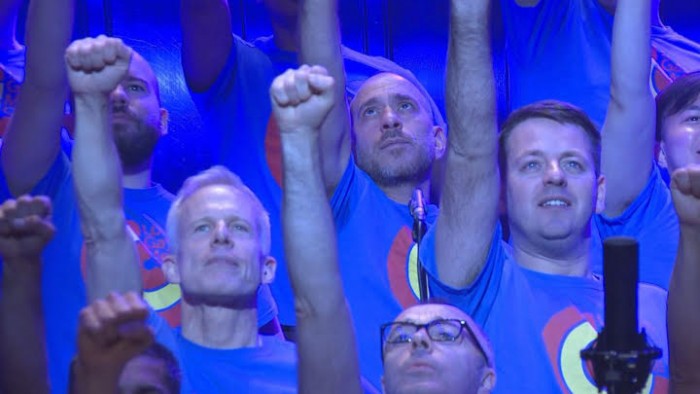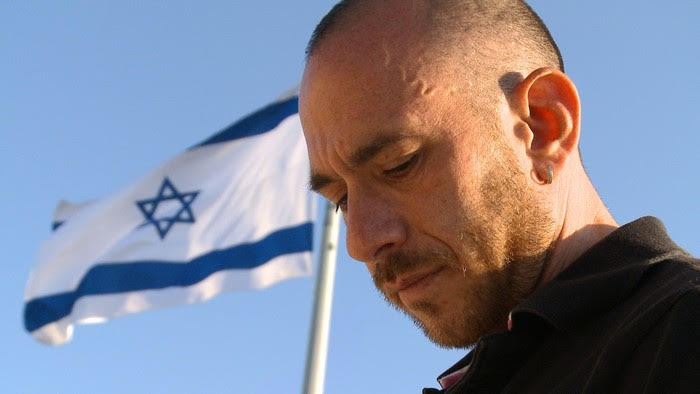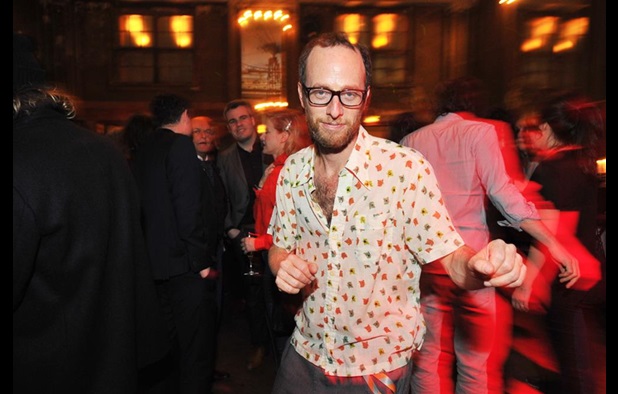
Co-director Barak Heymann at the “We Are UK” Film Party in the Berlinale Film Festival, Feb 2016. Photo: ScreenDaily
In part one of this two-part film spotlight, I commented on Who’s Gonna Love Me Now?, a fine documentary feature and official selection at the 2017 Seattle Jewish Film Festival. I spoke recently with Barak Heymann, the co-director and -producer of the film in question, and you can read a transcript of our conversation, held via Skype from Seattle to Tel Aviv, below.
John Boucher: Hi, Barak!
Barak Heymann: Hi John. You have seen the film right?
JB: Yes, I have.
BH: What was the most touching or relevant element in it for you?
JB: This is already a reverse interview!
BH (laughing): Yes!
JB: Well, one thing that really struck me about this movie is that it’s not trying very hard to force me to feel anything in particular about its subject matter, themes or characters. You’ve presented a scenario full of complex questions, and you’ve allowed viewers space in which to consider them. And you accomplish that via fairly simple — and I don’t mean simplistic — tools like dialogue. There are great moments of dialogue where conversations begin to happen, then are interrupted; and there is this discomfort throughout that I think will be familiar to a lot of your audience members. And the fact that you and your brother allow these scenes to happen, and you don’t have a lot of yourself in it like a Michael Moore or a Werner Herzog…
BH: Not at all. Not at all — you don’t hear our voices even once.
JB: Exactly. And as an editor, I’m also keen on the editorial choices that you made. While you’re certainly present in the edit, that presence feels neither overbearing nor manipulative. It’s really generous as a filmmaker toward your audience to say, “Here, we’re going to give you these images and these moments, but we’re not going to push your buttons to make a political or ideological point. We’re going to respect you.” Is that generally your approach toward documentary film making?
BH: I think in many ways the approach is to create the kind of film, in a way, that we would enjoy and be moved by watching ourselves. So it’s not like trying to guess what would be interesting or moving to some imaginary audience, but also what would be interesting and moving to us.
JB: Right.
BH: So we look at our audience in a very kind of eye-to-eye level. We’re not patronizing them. We don’t look at them like they are less smart and less sophisticated than us; and also not trying to please them or flatter them like they are more sophisticated and smarter than us. So we try to listen to our gut feelings, and we try to be as simple and as human and as communicative as possible, yet being deep, intellectual and thoughtful — like, there is no contradiction between simplicity and deepness and complexity.
JB: I agree with that and it really comes through in this particular piece.
BH: And the films that I love to watch are the style of films that I try to make, which are films that give me at the same time a lot to think about: about my life, about my relationships, about sexuality, about future, about past, about family, about everything; and also give me good entertainment, with humor. This film is at the same time very serious, deep, and heavy, and also funny and energetic. And life is like this. Life is not only depressing and complicated — also full of adventures, and laughs and happiness — it’s all together. Every day each one of us is experiencing moments of happiness and moments of sadness and being very worried. It’s not only this or that.
And Saar, the main character in the film — his life has everything, so we try to give it a place in the film. And also the relationship between him and his family is a love and hate relationship; they love him, they miss him, they want him back next to them; and at the same time they are very very angry, very disappointed and very much afraid. It’s all together. He’s very keen to be back on good terms with them; he’s longing to get their love and acceptance; at the same time he is very happy to create his own alternative chosen family in this London Gay Men’s Choir. So when he told us at the beginning of the shooting process, “Read my lips: I’ll never go back to Israel; I’ll never go back to live next to my family,” we felt there was a very big gap, distance, between what he says and what he truly feels. And so his lips were saying, “I’ll never go back to Israel,” but his eyes were saying, “Nothing I want more than to go back to Israel.” And in some ways his life, and our film, is in between those two places: between what he says and what he actually feels. And that’s what made him such an interesting subject, such an interesting character, to make this film about.
JB: How did you meet Saar? How did this project come about?
BH: It was more than 20 years ago when my brother, who directed and produced this film with me, met him in a night club in Tel Aviv, and they had a one night stand; and the morning after, all of a sudden, Saar put this Jewish yamaka on his head — what religious people put on their head; we call it kippah, in English it is yamaka — And then of course my brother asked him, “What happened here? How is it possible? What’s going on here? I did not feel so much God last night here in this bedroom. How come he all of a sudden jumped into the story?” And Saar said, “Oh it’s a long painful story; I have a long painful relationship with my family and I really don’t want to get into it right now. Let’s keep the good energy and forget about it. One day I will tell you. But I can just say I’m coming from a conservative, religious Jewish family from a kibbutz up in the north of Israel, and one day maybe I will agree to tell you more.” And this one day came, and he told the story to my brother, and of course my brother wanted to make a film about it because it felt so interesting and emotional and full of conflict and question marks about belonging, about family, about parenthood, about brotherhood; but Saar never wanted us to make this film about him and his family because he already felt such exposure. Only in 2011, when my brother met him in London, all of a sudden he said, “I’m ready to jump in; I’m ready to do this film together with you guys.” And then we immediately decided our condition for making this film is if all the family agreed to be in the film. It took us some time, but we convinced them all, all the brothers and sisters and mother and father, to be part of it; and it took us five years to finally complete it, until we finally premiered it at the Berlin Film Festival in February 2016.
JB: And it won an award there.
BH: Yes, the Audience Award.
JB: What do you hope this film might add to the conversation around all of the issues in it, like family, religion, sexuality, disease, relationships?
BH: We have screened the film literally all around, everywhere in the world, from Australia to America to Europe to Africa to Asia — everywhere. And some of the screenings were very dramatic and crazy, in a way — like at an LGBT film festival in Moscow, for example, where people are being beaten up in the streets for being gay. It was a very touching and moving screening, and it won awards there as well, which was a great experience; Or to Jewish, orthodox religious people here in Israel, we screened it in a secret place where no one could know about it, because they were so hysteric that no one could ever know about it, even — which was very exciting for them, to see the mother showing that there is no contradiction between being a religious believer, Jewish woman, and being a loving mother to a gay guy.
And at the same time I can say, for me, one of the biggest compliments I received for this film was from a very good friend of mine, who is not gay, who is not HIV positive — nothing to do with this kind of story— and he went to the cinema and then told me, “Oh my god I am so angry with you, because you made me do something I managed not to do for so many years, which is to simply talk to my father — just about life, just about our relationship.” And for me this is kind of an achievement and compliment because it proved to me that this film is not just about those issues about being gay, or being HIV positive, or being religious, or about being away from Israel, because this guy is none of those things and still it touched him very deeply, because it is talking about communication more than everything else; it is talking about the ability of human beings to heal their wounds, to better their relationships with each other by talking, by listening; because listening to someone who is saying complicated things to you about you is a very difficult thing to do, even more difficult than to say things.
JB: Yes, and the cinematic experience allows us — the camera is listening, the filmmakers are listening, and so they are demonstrating that kind of active listening you’re talking about. And as film viewers we can take that cue, and we can watch the filmmakers listen to these other people trying to listen to each other. It’s an interesting recursive situation that cinema creates for us in that regard. I think that’s another reason why I like so much that, as filmmakers, you haven’t injected yourself directly into the scenario, because it helps people define that space for themselves and make those connections for themselves.
BH: Exactly, because it wasn’t relevant. It wasn’t interesting.
JB: I went through film school with my brother, and I find it interesting that you do so much work with your brother Tomer. I was wondering if you wanted to say something about your process working together as a team.
BH: It’s very different from one film to another. In this particular film, when we were both directing and producing together, it was kind of divided, in a way, with me being mostly responsible for shooting in Israel, especially with all the siblings: brothers and sisters and father and mother; and with him being responsible for most of the shooting in London, on the visits of the father and mother and all the dramatic moments they experienced there.
JB: And do you edit together? How does post-production work for you two?
BH: We don’t spend so much time physically together in the editing room. It is more like he would create a sequence with the editor, then I would come after one or two weeks very fresh in my mind and say, “This part is great, this part is not great at all, let’s try something completely different.” And then we’ll spend some time together, and then I’ll spend some time myself with the editor and then we create something different and I’ll think, “This is unbelievable, this is so good,” and then he’ll come back after one or two weeks and say, “This is terrible, it must be destroyed; but there is one thing which went much better so let’s combine it.” It’s like ping-pong. But at the end of the day it never happens that there is something I really liked that he didn’t, or that he liked that I didn’t, so even if we are very different human beings, when something is working good, then both of us feel that it is working good. We don’t care so much about who has the credit for the idea, but it’s more important that we’re both happy with the idea and that we can stand proudly behind it.
JB: I’m wondering what you’d like to see more of from gay documentary cinema. What do you think the genre needs moving forward?
BH: I have an answer, but I think it should be addressed not to the filmmakers but to society. I wish to see, more and more, films with gay people where no one makes a big fuss about them being gay, but do make a big fuss about other aspects of their personality. You know what I mean? Like, someone can be an asshole or a good guy, but the fact that he’s gay is only one more thing in his life. No one makes a big deal out of someone who’s straight, right? So more films where people who are gay are just being gay, and no one really gives a shit about it. But this is a very hot topic, and a bit of a childish and romantic point of view, and obviously it will take many years until we get there; maybe we will never get there. It’s like me, coming from Israel, desiring that Muslim Arab people would be just people, and no one would treat it any differently or in any special way — not for the good and not for the bad — because they are Muslim and Arab people. They are just people. But I don’t think I’ll be alive to see such a thing here in Israel.
JB: That makes me think of escaping the weight of history a little bit, and seeing each other as human beings without all of the attachments that history gives us, to a certain extent. Not forgetting history, but finding a fresh approach to how we interact with each other. And maybe some de-politicization, and focusing more on human qualities. You’re talking about, essentially, showing round characters, and that seems to be in Who’s Gonna Love Me Now. Saar is a very round character. He isn’t lionized. You don’t portray him as some perfect person who is misunderstood.
BH: Of course. Of course not, because he is not. And I think this is also something that he understands throughout the film: that not only he paid a heavy price for the ignorance and the conservative nature of his family, and for their religiousness; but they also paid a heavy price for his lifestyle, and for his irresponsibility, and for him being very different from them. And of course I’m not protecting some of their statements, which are obviously very tough ones that are also difficult for me to hear; but I wish we managed to deliver this conflict between Saar and his family to the viewer in a very wide and complicated way, because it is wide and complicated. There are no good ones or bad ones. It’s not like he’s the saint and the victim, and they are the horrible people. No. Because he also hurt them in his way — without wanting it, without meaning it — and they hurt him, not at all because they are bad people who don’t love him; they hurt him because they are very different from him and they did what they could do. And the beautiful thing for me, and the optimistic message of this film, is that people can change.
JB: Could you give us a first-hand account, as a documentarian, of gay life where you are, in terms of civil rights and the status of gay people in Israel right now?
BH: It’s a very strange and complicated situation when you have, on one hand, very open minds, and liberal and free company, but at the same time very conservative, violent, racist, homophobic — it all lives one next to another. So on one hand, in June the gay pride parade will attract hundreds of thousands of gay people from all over the world, and they will all feel — and they will all be sure, actually — that Tel Aviv is heaven for gay people, and there is no such a place like this, and this is the most open minded, liberal, free place on Earth; but at the same time the gay people in Israel know, because they experience it on a daily basis, that they suffer from a lot of homophobia and racism. The police are still looking for the guy who killed young gay people in the heart of Tel Aviv. In Jerusalem, in the gay parade two years ago, there was a man who stabbed to death a young girl who is not even gay but who came to support her brother or sister or something like this. And the law is still not treating gay people equally. So you could think it’s a great, beautiful place for gay people, but the struggle is still deep in the process and far, far, far from being completed.
JB: Do you think that film can have an impact on bringing about change?
BH: I think that films are not changing the reality at all, and not changing the big picture at all, but films can change dramatically some people at certain points in their lives. So if there is one person in Israel or anywhere else — and I know that there are actually many of them because the film was screened successfully in cinemas here and did receive a lot of feedback, and email, and letters from people; and I know there are many people who have seen the film and got inspired, and got a lot of power from the film to finally speak out with their family; and there are people who saw the film and for the first time in their lives could stand with their kids, and are not embarrassed by them anymore, and not ashamed by them. And so it did change the life of many people. It did not change the reality of the society or the policy of any government. It is changing the life of some people, that’s all. But for me, it is a very big thing.
JB: Has your film had a profound effect on Saar and his family and how they interact now?
BH: They always say that Saar would never have returned to Israel without the film making process of this film, so for them it is a very dramatic turning point in their lives.
JB: This is my first experience with your work, and I’m looking forward to what you do next. What are you working on now?
BH: My brother is directing a film about a gay porn star who lives in Israel, focusing on his relationship with his mother. And I am making a film about an Israeli politician that I admire very much.
JB: Thanks for your time, and for making such a great film.
BH: Thank you!
Who’s Gonna Love Me Now screens as a part of the Seattle Jewish Film Festival at AMC Pacific Place on 26 March at 8 PM. The screening will include a 10-minute-long, pre-film performance by members of the Seattle Men’s Chorus. You can find more information about this and other festival films at seattlejewishfilmfestival.org.
About the Author: John Boucher
Related Posts
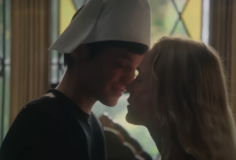
*Seattle Cinemaland • Arts & Entertainment • Film • Geek • Graphic Novels • Queer Film • Streaming Cinema
Movies To Check Out: The Very Queer 100 Nights of Hero
Are you looking for a film to watch and enjoy

*Seattle Cinemaland • Arts & Entertainment • Arts News • Capitol Hill News • Community • Community Events • Community News • Film • Film Events • Film Festivals • News • Queer Film • Queer News • Seattle News • Seattle Queer Film • Seattle Transgender Scene • Three Dollar Bill Cinema • Trans* Arts & Entertainment • Trans* Events
Seattle’s Brand New Transgender Film Festival: STUFF!!!
Well, there’s always something changing over at Three Dollar Bill

*Beefcake Babylon • 18 and Up • Adult Entertainment • Adults Only • Arts & Entertainment • Film • Film Events • Leather/Fetish/Gear/Kink • Pornolicious • Queer Film • Seattle Pride 2025 • The Nooner • Weekend Calendar
Seminal Gay Film At Northwest Film Forum This Month!
Heh, heh…seminal. Yes, it truly is! Acclaimed gay filmmaker FRED

*Beefcake Babylon • *Seattle Cinemaland • Adult Entertainment • Adults Only • Arts & Entertainment • Film • Film Events • NSFW • Pornolicious • Queer Film • Seattle Queer Film • The Nooner • Weekend Calendar
Bruce LaBruce’s Sexy New Film “The Visitor” Screens At Beacon
The Seattle Erotica Cinema Society has been bringing deliciously sexy
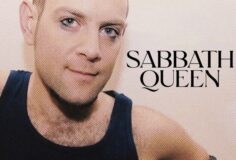
*Seattle Theaterland • Arts & Entertainment • Arts News • Film • Film Festivals • News • Three Dollar Bill Cinema • Uncategorized
Seattle Jewish Film Festival Screens LGBTQ Films
Seattle’s own LGBTQ+ film festival non-profit Three Dollar Bill Cinema is
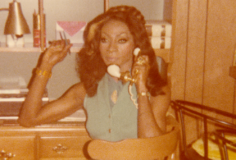
*Seattle Cinemaland • *Seattle Musicland • Arts & Entertainment • Film • Gay 101 • Music - R&B Urban • Now Playing • Queer Film • Seattle Queer Film • Seattle Transgender Scene • Trans* Arts & Entertainment • Trans* Events
Check Out “Any Other Way: The Jackie Shane Story” At NW Film Forum
There’s a terrific trans documentary to check out this weekend


